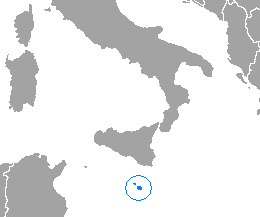
Maltese is a Semitic language derived from late medieval Sicilian Arabic with Romance superstrata. It is spoken by the Maltese people and is the national language of Malta, and the only official Semitic and Afroasiatic language of the European Union. Maltese is a Latinised variety of spoken historical Arabic through its descent from Siculo-Arabic, which developed as a Maghrebi Arabic dialect in the Emirate of Sicily between 831 and 1091. As a result of the Norman invasion of Malta and the subsequent re-Christianization of the islands, Maltese evolved independently of Classical Arabic in a gradual process of latinisation. It is therefore exceptional as a variety of historical Arabic that has no diglossic relationship with Classical or Modern Standard Arabic. Maltese is thus classified separately from the 30 varieties constituting the modern Arabic macrolanguage. Maltese is also distinguished from Arabic and other Semitic languages since its morphology has been deeply influenced by Romance languages, namely Italian and Sicilian.

Malta, officially the Republic of Malta, is an island country in Southern Europe located in the Mediterranean Sea. It consists of an archipelago 80 km (50 mi) south of Italy, 284 km (176 mi) east of Tunisia, and 333 km (207 mi) north of Libya. The two official languages are Maltese and English. The country's capital is Valletta, which is the smallest capital city in the EU by both area and population. With a population of about 542,000 over an area of 316 km2 (122 sq mi), Malta is the world's tenth-smallest country by area and the ninth most densely populated. Various sources consider the country to consist of a single urban region, for which it is often described as a city-state.

Malta has been inhabited since 5900 BC. The first inhabitants were farmers; their agricultural methods degraded the soil until the islands became uninhabitable. The islands were repopulated around 3850 BC by a civilization that at its peak built the Megalithic Temples, which today are among the oldest surviving buildings in the world. Their civilization collapsed in around 2350 BC; the islands were repopulated by Bronze Age warriors soon afterwards.

Valletta is the capital city of Malta and one of its 68 council areas. Located between the Grand Harbour to the east and Marsamxett Harbour to the west, its population as of 2021 was 5,157. As Malta’s capital city, it is a commercial centre for shopping, bars, dining, and café life. It is also the southernmost capital of Europe, and at just 0.61 square kilometres (0.24 sq mi), it is the European Union's smallest capital city.

The Sovereign Military Order of Malta (SMOM), officially the Sovereign Military Hospitaller Order of Saint John of Jerusalem, of Rhodes and of Malta, and commonly known as the Order of Malta or the Knights of Malta, is a Catholic lay religious order, traditionally of a military, chivalric, and noble nature. Though it possesses no territory, the order is often considered a sovereign entity under international law.
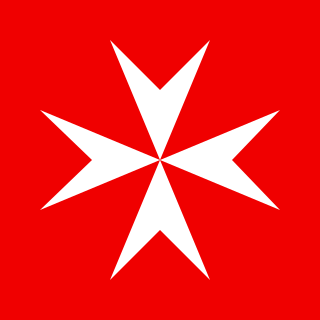
The Maltese cross is a cross symbol, consisting of four "V" or arrowhead shaped concave quadrilaterals converging at a central vertex at right angles, two tips pointing outward symmetrically.
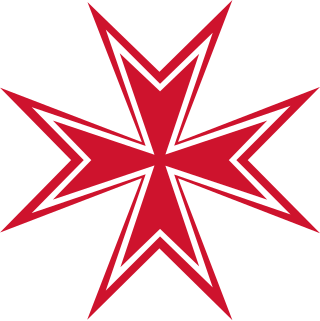
The Malta national football team represents Malta in men's international football and is controlled by the Malta Football Association, the governing body for football in Malta.
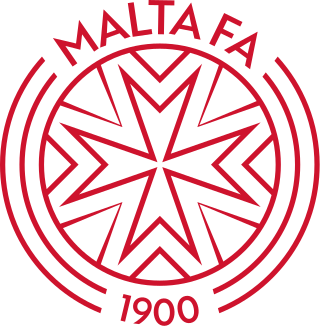
The Malta Football Association is the governing body of football in Malta.

A European microstate or European ministate is a very small sovereign state in Europe. In modern usage, it typically refers to the six smallest states in Europe by area: Andorra, Liechtenstein, Malta, Monaco, San Marino, and Vatican City. Andorra, Liechtenstein, Monaco and Vatican City are monarchies. These states trace their status back to the first millennium or the early second millennium except for Liechtenstein, created in the 17th century.
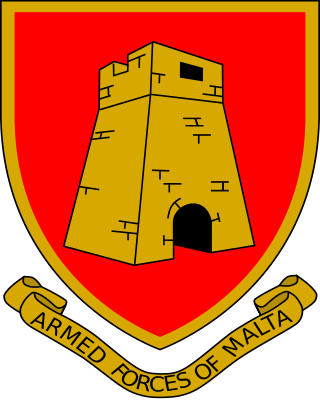
The Armed Forces of Malta is the name given to the combined armed services of Malta. The AFM is a brigade sized organisation consisting of a headquarters and three separate battalions, with minimal air and naval forces. Since Malta is the guardian of the European Union's southernmost border, the AFM has an active role in border control.

The Great Siege of Malta occurred in 1565 when the Ottoman Empire attempted to conquer the island of Malta, then held by the Knights Hospitaller. The siege lasted nearly four months, from 18 May to 8 September 1565.

The University of Malta is a higher education institution in Malta. It offers undergraduate bachelor's degrees, postgraduate master's degrees and postgraduate doctorates. It is a member of the European University Association, the European Access Network, Association of Commonwealth Universities, the Utrecht Network, the Santander Network, the Compostela Group, the European Association for University Lifelong Learning (EUCEN) and the International Student Exchange Programme (ISEP).

Freemasonry in Malta has a lengthy history dating from the eighteenth century. The main masonic influences have been from the United Grand Lodge of England, the Grand Lodge of Scotland, and the Grand Lodge of Ireland. Today Regular Freemasonry is under the jurisdiction of the English Constitution since 1815, the Sovereign Grand Lodge of Malta, which was formed in 2004 as well as the Grand Lodge of Scotland.

The Maltese people are an ethnic group native to Malta who speak Maltese, a Semitic language and share a common culture and Maltese history. Malta, an island country in the Mediterranean Sea, is an archipelago that also includes an island of the same name together with the islands of Gozo and Comino ; people of Gozo, Gozitans are considered a subgroup of the Maltese.

The Times of Malta is an English-language daily newspaper in Malta. Founded in 1935, by Lord and Lady Strickland and Lord Strickland's daughter Mabel, it is the oldest daily newspaper still in circulation in Malta. It has the widest circulation of any Maltese newspaper. The newspaper is published by Allied Newspapers Limited, which is owned by the Strickland Foundation, a charitable trust established by Mabel Strickland in 1979 to control the majority of the company.

The Order of Knights of the Hospital of Saint John of Jerusalem, commonly known as the Knights Hospitaller, is a Catholic military order. It was founded in the crusader Kingdom of Jerusalem in the 12th century and had headquarters there until 1291, thereafter being based in Kolossi Castle in Cyprus (1302–1310), the island of Rhodes (1310–1522), Malta (1530–1798), and Saint Petersburg (1799–1801).

Gozo, in antiquity known as Gaulos, is an island in the Maltese archipelago in the Mediterranean Sea. The island is part of the Republic of Malta. After the island of Malta itself, it is the second-largest island in the archipelago.

The Crown Colony of the Island of Malta and its Dependencies was the British colony in the Maltese islands, today the modern Republic of Malta. It was established when the Malta Protectorate was transformed into a British Crown colony in 1813, and this was confirmed by the Treaty of Paris in 1814.

Hospitaller Malta, known in Maltese history as the Knights' Period, was a de facto state which existed between 1530 and 1798 when the Mediterranean islands of Malta and Gozo were ruled by the Order of St. John of Jerusalem. It was formally a vassal state of the Kingdom of Sicily, and it came into being when Emperor Charles V granted the islands as well as the city of Tripoli in modern Libya to the Order, following the latter's loss of Rhodes in 1522. Hospitaller Tripoli was lost to the Ottoman Empire in 1551, but an Ottoman attempt to take Malta in 1565 failed.
The COVID-19 pandemic in Malta was a part of the worldwide pandemic of coronavirus disease 2019 caused by severe acute respiratory syndrome coronavirus 2. The first case of the disease in Malta was an Italian 12-year-old girl on 7 March 2020. The girl and her family were in isolation, as required by those following the Maltese health authority's guidelines who were in Italy or other highly infected countries. Later, both her parents were found positive as well.















